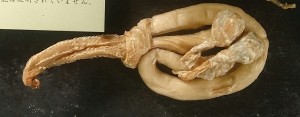Ah, poaching. It sounds so romantic. The merry strains of the English folk song, “The Lincolnshire Poacher“, that we sang at school come into my ear:
When I was bound apprentice in famous Lincolnshire
Full well I served my master for nigh on seven years
Till I took up to poaching as you shall quickly hear
Oh, ’tis my delight on a shiny night in the season of the year.
We think of the cheerfully naughty countrymen pushing a hare or a pheasant into their bag, making off home and delighting their wives with something to put into the pot for their families. We hardly spare a thought for the landowners, and if we do, it is with a pantomime image of greedy, fat, rich and selfish characters who “will not sell their deer”. Cue a chorus of boos and hisses from the gallery.
But (like most rose-tinted views of the world) this is all wrong. Poaching on that scale may or may not still exist: but much worse forms of it certainly do.
In Britain, poaching is organized crime, and becoming big business. Stolen game, farm animals and wild fish, especially salmon, find their illegal way into the human “food chain” (the term is borrowed from an older view of ecology, where it has fallen into disuse, and of course it has shifted its meaning: we consumers do not eat slaughterhouse workers, or supermarket shelf-stackers). There is no inspection of the unlawfully sold meat, which may be infected with tuberculosis (TB), may have been handled unhygienically, or may simply be past what should have been its sell-by date. There is no attempt to manage the ‘crop’ sustainably. If a wounded deer escapes, it will receive no veterinary treatment for its injuries or infections. In short, the whole sorry business is about money, with none of the usual protections that we expect in food and farming.
Across the world, matters are even worse. As roads cut into rainforests all through the tropics, the poor go into the remaining wildlife-rich areas to kill anything worth eating for bushmeat. In lawless areas, hunting the last of the game animals is an easy way for anyone with a gun to earn a little money. Once common and widespread species in many groups – monkeys, deer, snakes, birds, you name it – are being driven towards extinction.

And of course, poaching can mean killing elephants for ivory, rhinoceroses for their horns, tigers for their skins or their penises, bears for the bile from their gall bladders. Frankly, even the most beautifully carved ivory statues cannot compensate for the loss of elephants in the wild. Even if a dose of tiger penis brought an erection so huge that a horde of beautiful women were to flock about me, an unlikely result, it would not make up for the loss of one of these magnificent animals, let alone their extinction. If you have erectile dysfunction, Viagra might help you; animal body parts certainly won’t.
There is nothing romantic about poaching. It is incredible that, although it is illegal in Britain, it is not a notifiable crime: the police do not have to keep any record of how many animals are killed, how much property damaged, how many crimes committed.
With wars and refugee crises, human suffering and epidemics of tropical diseases from Malaria to Ebola virus, it is no wonder that poaching gets scant mention. Yet all the while, when there is money to be made, wildlife gets short shrift. Satellite imagery shows deserts expanding, forests burning. The destruction wrought by poaching is less visible, but it is having a terrible effect on hundreds of species.
You can do something about it. Support a wildlife charity. Campaign against the use of animal body parts in traditional medicine. Lobby your member of parliament, your government. Vote for a greener government next time. Now is the time to get on with it.
